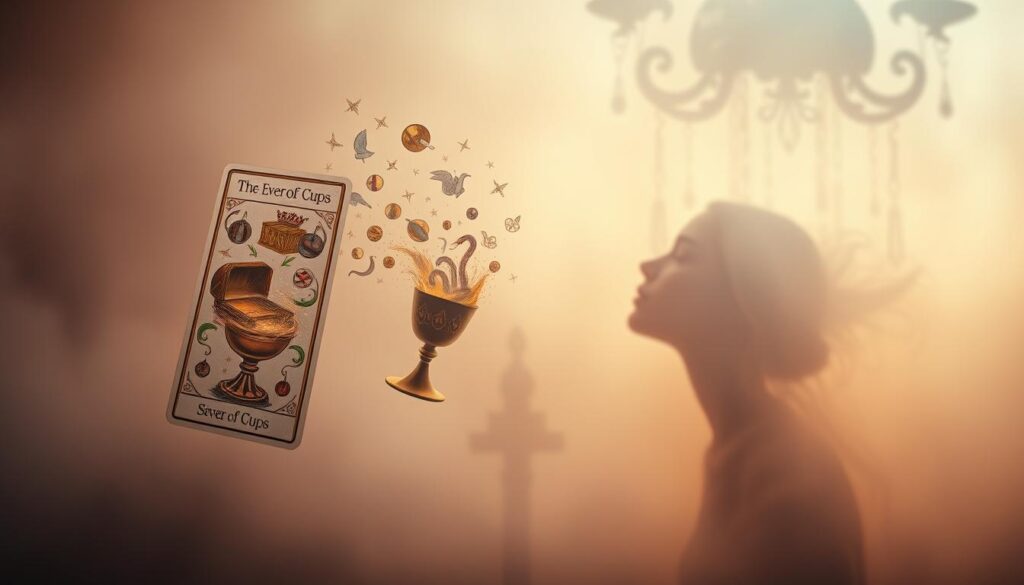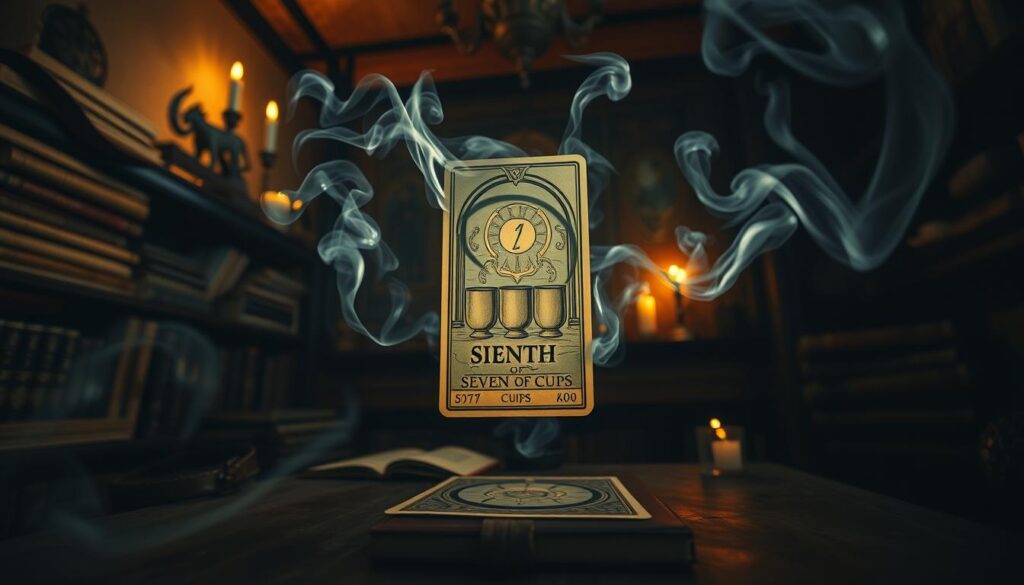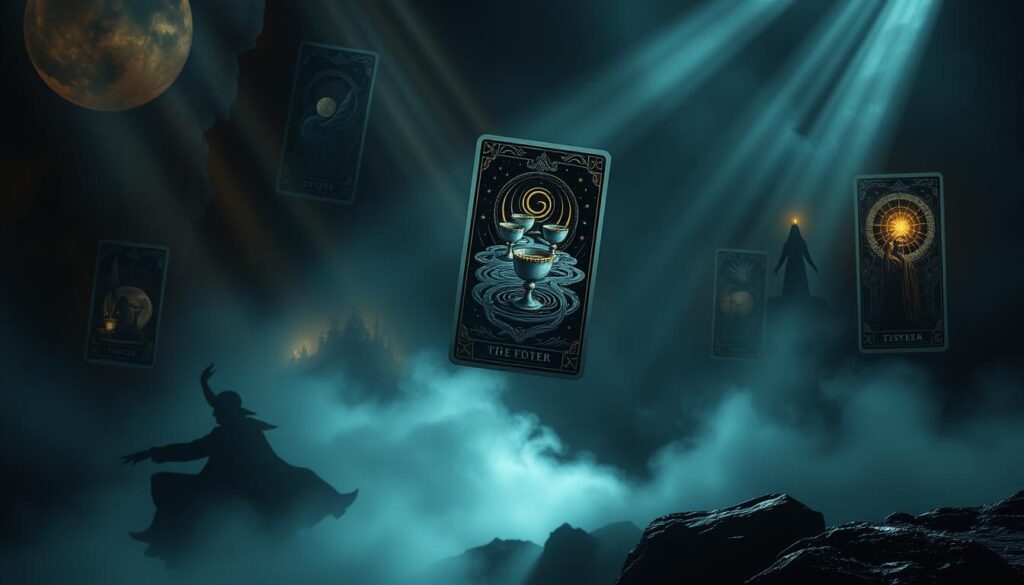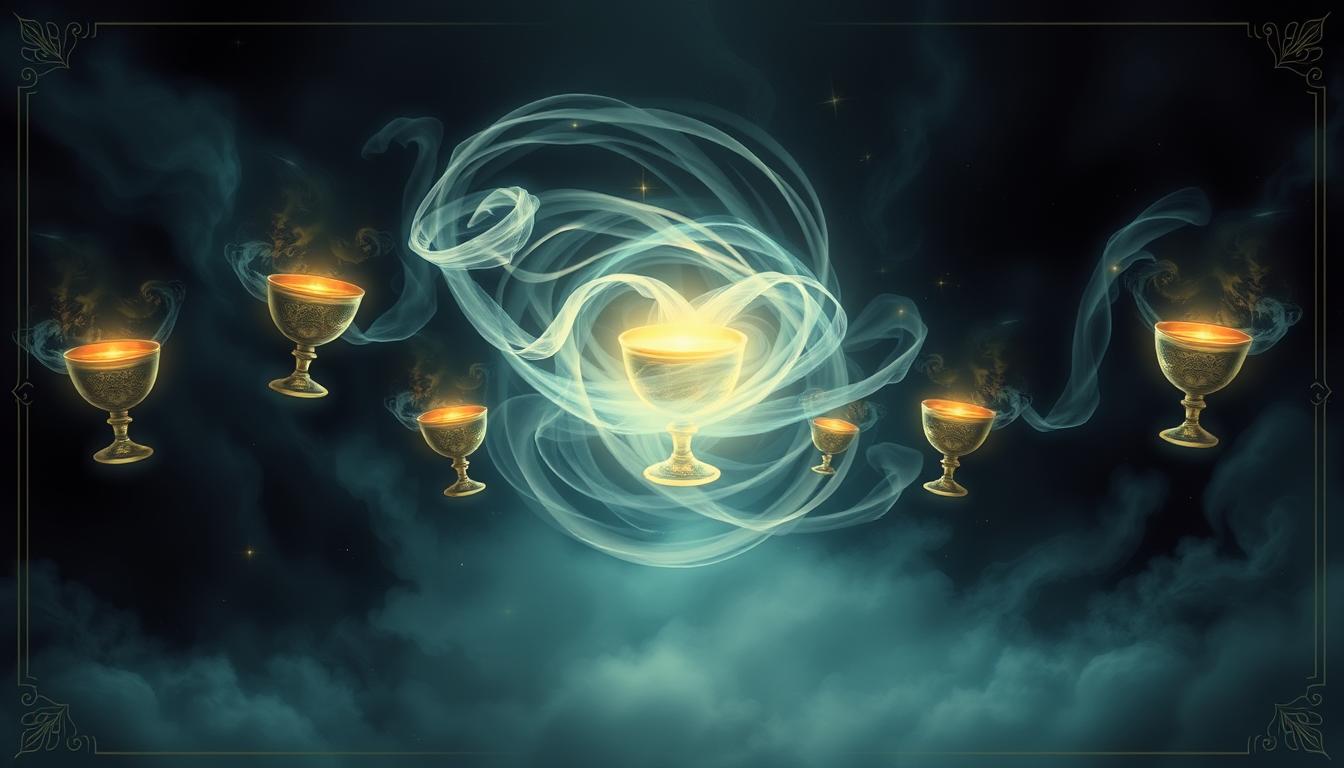The Seven of Cups represents a world of possibilities—some real, some mere illusions. This tarot card shows a person surrounded by floating cups, each holding different visions. Some offer jewels, while others hide snakes, symbolizing the mix of opportunities and pitfalls in life.
Clouds in the background highlight the fine line between dreams and reality. Too many choices can lead to confusion, making it hard to see what truly matters. The card warns against wishful thinking, urging you to stay grounded.
Modern struggles like “shiny object syndrome” mirror this tarot’s message. Whether in love, career, or personal growth, discernment is key. Not every tempting option is worth pursuing.
Key Takeaways
- The Seven of Cups warns about illusions mixed with real opportunities.
- Clouds symbolize dreams, while the cups represent varied life choices.
- Too many options can create decision paralysis.
- Discernment helps separate fantasy from reality.
- Modern challenges like distraction align with this card’s lesson.
Understanding the Seven of Cups Tarot Card
Dreams and dangers collide in this visually rich tarot imagery. The card shows seven floating cups, each holding a different vision—some glitter with jewels, while others hide snakes. This contrast highlights life’s mix of opportunities and pitfalls.

Clouds swirl behind the cups, symbolizing the gap between imagination and reality. The figure stands with their back turned, lost in thought. This posture reflects indecision, a core theme of the seven cups.
Historically, the card dates to 15th-century tarot decks. Its message remains relevant today. Modern struggles like endless choices on dating apps or career paths mirror its warning about overwhelm.
Key symbols to note:
- Jewels: Tempting but fleeting rewards.
- Snake: Hidden risks in seemingly good options.
- Clouds: Mental fog obscuring clear decisions.
The card teaches discernment. Not every shiny opportunity aligns with your goals. Ground yourself in reality to avoid illusions.
Upright Seven of Cups Meaning
When this card appears upright, it signals a flood of possibilities—some promising, others deceptive. Each floating cup holds a potential path, testing your ability to distinguish fantasy from opportunity. Below, we explore its impact on love, career, and personal well-being.

Love and Relationships
In relationships, the card warns of temptation. You might juggle multiple suitors or romanticize a fleeting connection. For example, choosing between a stable partner and an exciting fling becomes harder when emotions cloud judgment.
Ground your decisions in reality. Lust-driven choices often fade, leaving discontent. The upright position urges clarity—ask which option aligns with long-term happiness.
Career and Finances
Career paths multiply here, but so does paralysis. An entrepreneur might chase five ideas yet execute none. Studies show multitasking slashes productivity by 40%. Commit to one direction to avoid wasted effort.
Financially, beware “get-rich-quick” schemes. Consult an advisor to vet opportunities. Not every shiny investment holds real value.
Health and Spirituality
Overextension threatens health. Daydreaming about fitness goals? Pair ambition with action—procrastination undermines progress. Try mindfulness to stay present.
Spiritually, balance exploration with practice. Dabble in meditation or service, but root growth in consistent effort. Avoid scattering energy across too many paths.
Reversed Seven of Cups Meaning
Flipping the script, the reversed seven cups shifts from illusion to awakening. Where the upright card drowns in options, the inverted version cuts through the noise. It’s a sign to confront confusion and reclaim control.

Love and Relationships
Chaotic dating patterns dominate here. Mixed messages or dead-end connections leave you exhausted. The reversal urges clarity—filter prospects through core values. For example, use dealbreakers on apps to weed out mismatches swiftly.
Ask: Does this align with my long-term needs? Emotional honesty trumps fleeting sparks. A career clarity tool can adapt for relationship audits too.
Career and Finances
Stuck in a job rut? The reversed card exposes missed opportunities. Conduct a skill audit to identify gaps. Networking with purpose—not just collecting contacts—opens new ways forward.
Financially, distractions like impulse buys blur goals. Try a budget template to track spending. Red flags for investments include vague promises or high-pressure pitches. Focus on reality, not hype.
Interpreting the Seven of Cups as Feelings
Ever felt stuck between endless options? This card captures that exact emotional whirlwind. Upright, it reflects confusion—like staring at a menu with 100 dishes but craving none. Your mind races, yet clarity feels just out of reach.

Physically, this overwhelm might show up as sleepless nights or irritability. Studies reveal that too many choices trigger decision fatigue, dropping productivity by 40%. Think of a wedding planner juggling 20 florists—paralysis sets in, not excitement.
Reversed, the card signals a breakthrough. Imagine post-breakup clarity: the fog lifts, and you see ex-partners’ flaws plainly. Reality replaces fantasy. As one expert puts it:
“Trust your instincts—they’re your compass through chaos.”
Grounding techniques help bridge the gap. Try journaling: list pros/cons, then circle what aligns with core values. For example, a job seeker might rank salary, growth, and culture—then eliminate mismatches.
Whether upright or reversed, this card’s message is clear: pause, breathe, and filter emotions through logic. Not every glittering cup holds gold.
Interpreting the Seven of Cups as Actions
Too many options can freeze progress—here’s how to break free. The Seven of Cups challenges you to move from thinking to action. Below, we share practical tools to cut through confusion and make confident decisions.

1. Sort options with the Eisenhower Matrix
Label each choice as urgent/important, urgent/not important, and so on. This method reveals which opportunities deserve your energy. For example, a career shift might rank as important but not urgent—schedule it, don’t rush.
2. Conduct a SWOT analysis
List strengths, weaknesses, opportunities, and threats for each path. A side hustle’s “threat” could be unstable income, while its “strength” is skill-building. Seeing it on paper clarifies reality.
3. Try the 24-hour rule
Pause before impulsive decisions. Sleep on it—emotions often cool overnight. One study found delaying purchases reduced regret by 30%.
“Clarity comes from action, not thought.” — Unknown
Digital tools help too. Trello boards or Notion templates visually organize choices. Color-code by priority or deadline. Avoid procrastination by setting micro-deadlines (e.g., “Research by Friday”).
Lastly, role-play: “What would I tell a friend?” This detaches emotion, spotlighting logic. Too many cups? Pour your energy into one—the rest are just illusions.
Seven of Cups in Yes or No Questions
Binary answers rarely fit life’s complexities, and this card knows it. The Seven of Cups resists simple “yes” or “no” replies, urging deeper reflection. Its floating visions symbolize choices clouded by fantasy—making quick judgments risky.

Upright, the card whispers “maybe.” It flags confusion, suggesting you need more data. For example:
“Is this job right?” → Research company culture and growth paths first.
“Should I date this person?” → Watch for red flags beyond initial chemistry.
Reversed, it leans “no” but demands clarity. A sign to pause:
“Should I move cities?” → Wait until financial/logistical doubts resolve.
“Is this investment wise?” → Consult a fiduciary before committing.
| Scenario | Upright Answer | Reversed Answer |
|---|---|---|
| Career change | Explore options | Reevaluate motives |
| Relationship | Assess compatibility | Walk away |
| Financial risk | Get expert advice | Decline |
Case Study: A client asked, “Should I stay in my marriage?” The upright card appeared, highlighting idealized memories. Guided sub-questions helped:
– What unmet needs exist?
– Have efforts to repair been mutual?
The reading revealed stagnation—prompting counseling, not immediate divorce.
“Tarot reflects possibilities, not fate. Use it to ask better questions, not seek absolutes.”
Avoid fatalism with reversed pulls. Instead of “never,” think “not yet.” Test illusions with logic: journal, consult trusted others, or sleep on big decisions.
Reinforcing and Opposing Tarot Cards
Tarot spreads gain depth when cards interact—some amplify themes, others challenge them. The Seven of Cups behaves differently when paired with specific cards, revealing hidden layers in readings.

Certain cards intensify its dreamy confusion. The Moon heightens illusions, making reality harder to discern. Pair them for shadow work—try a dream journal to unpack subconscious fears.
With the Seven of Swords, deception risks spike. Create a fraud prevention checklist: verify offers, research claims, and trust gut instincts when things feel “too good.”
Contrast comes from the Chariot. Its decisive energy counters paralysis. Use a daily action planner to focus on one goal. Track progress to stay grounded.
The Emperor brings structure to chaos. His energy helps organize financial choices. Try a budget spreadsheet—categorize needs versus wants to avoid shiny distractions.
For mental clarity, add the Ace of Swords. Its critical thinking prompts cut through fog. Ask: “What evidence supports this option?” before committing.
“Card positions matter—in Celtic Cross spreads, neighboring cards modify the central meaning.”
Notice color symbolism too. The Seven of Cups’ muted tones differ from the Emperor’s bold reds—a visual sign of their opposing energies.
While some others amplify confusion (like the Devil), these strategic pairings help navigate the card’s warnings with practical tools.
Conclusion
Life presents endless choices, but not all lead to real growth. The tarot card reminds us that opportunities often come disguised as illusions. Stay grounded by using decision tools like SWOT analysis or the 24-hour rule.
Schedule weekly “reality checks” to review goals. Journal prompts help:
“Does this align with my values?”
“What evidence supports this path?”
A printable worksheet can streamline evaluations.
As one insightful quote notes: “Treasures and monsters hide in the same cups.” Share your experiences with this card’s lessons below. Next, we’ll explore The Moon—another guide through life’s foggy moments.

